
Merry Christmas is a Christmas-themed compilation album by Bing Crosby that was released in 1945 on Decca Records. It has remained in print through the vinyl, CD, and downloadable file eras, currently as the disc and digital album White Christmas on MCA Records, a part of the Universal Music Group, and currently on vinyl as Merry Christmas on Geffen Records. It includes Crosby's signature song "White Christmas", the best-selling single of all time with estimated sales of over 50 million copies worldwide. The album was certified 4× Platinum by RIAA for selling over 4 million copies in United States. The original 1945 release and subsequent re-releases and re-packages spent a total of 39 weeks at no. 1 on the Billboard pop albums chart.
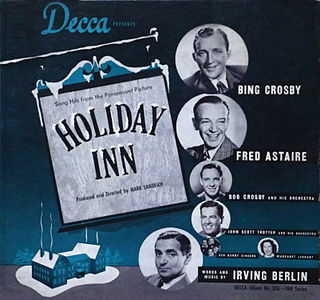
Song Hits from Holiday Inn is a studio album of phonograph records by Bing Crosby and Fred Astaire released in July 1942 featuring songs presented in the American musical film Holiday Inn. These are the longer studio recorded versions of the songs presented in the film. For the songs that were actually in the film, see Holiday Inn (soundtrack). This album is not only notable because it is one of the greatest works of the highly regarded songwriter Irving Berlin, but it is only Crosby's third studio album. This was also the first release of Crosby's signature song "White Christmas" on shellac disc record. The 1942 version would be released only one more time, in 1945's compilation album, Merry Christmas, before the song was re-recorded in 1947. The later version became the standard.
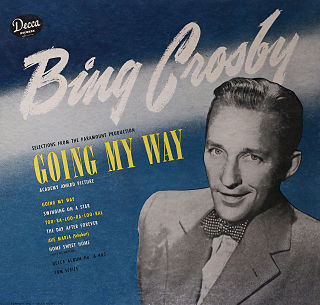
Selections from Going My Way is a studio album of phonograph records by Bing Crosby released in late 1945 featuring songs that were presented in the American musical comedy-drama film Going My Way. This was the first release of one of Crosby's best songs throughout his career, "Swinging on a Star", on shellac disc record.

Christmas Music is a compilation album of phonograph records put together for the Christmas season by Decca Records in late 1940. The album features the most popular artists recording for Decca such as: Bing Crosby, Kenny Baker, Men About Town and Eddie Dunstedter. It features Bing Crosby's first commercial release of "Silent Night", the 1942 version of which went on to sell 30 million copies.
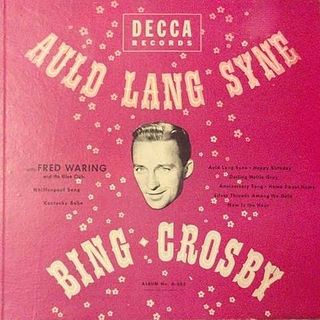
Auld Lang Syne is a compilation album of phonograph records by Bing Crosby released in 1948 featuring songs that were sung by Crosby and also by Fred Waring and his Glee Club. The songs were later presented in 33 1/3 rpm and 45 rpm sets, respectively. This set featured many of Bing's great hits such as: Silver Threads Among the Gold and Now Is the Hour.

Favorite Hawaiian Songs is a compilation album of phonograph records by Bing Crosby released in 1940 featuring songs that were sung in a Hawaiian-type genre. This is the second album release of many of Crosby's Hawaiian hits such as: Blue Hawaii and Sweet Leilani.

Favorite Hawaiian Songs, Volume One is a compilation album of phonograph records by Bing Crosby released in 1946 featuring songs that were sung in a Hawaiian-type genre. This was the fourth Hawaiian-themed album release for Crosby.

Favorite Hawaiian Songs, Volume Two is a compilation album of phonograph records by Bing Crosby released in 1946 featuring songs that were sung in a Hawaiian-type genre. This was the fifth Hawaiian-themed album release for Crosby.

Star Dust is an album of phonograph records by Bing Crosby released in 1940 featuring songs that are sung sentimentally, being based upon the 1927 popular song "Stardust". This album featured his 1939 Decca recording of the song, not the 1931 recording he made for Brunswick.

Don't Fence Me In is a compilation album of phonograph records by Bing Crosby and The Andrews Sisters released in 1946 featuring Country and Western songs. This album contained the enormously popular record "Pistol Packin' Mama", which sold over a million copies and became the first number one hit on the then-new Juke Box Folk Song Records Chart that was later renamed the Hot Country Songs Chart.
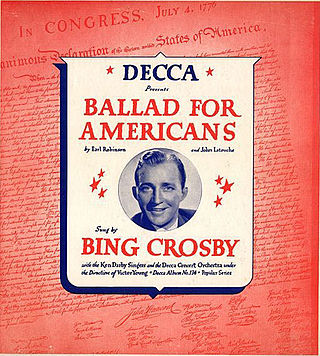
Ballad for Americans is a studio album of phonograph records by Bing Crosby released in 1940 featuring the popular "Ballad for Americans" sung by Crosby in an American-type patriotic style. In 1946, the two records in this album were put into a new album called What We So Proudly Hail. This was Crosby's first studio album that was not a reissue of earlier singles.

Music of Hawaii is a compilation album containing five 78rpm records of Hawaiian music issued by Decca Records.

Victor Herbert Melodies, Vol. 1 is a studio album featuring five 78 rpm phonograph records recorded by artists Bing Crosby, Frances Langford, Florence George and Rudy Vallee celebrating the music of Victor Herbert. The recordings were made in December 1938 by Decca Records, who were probably aware that a film called The Great Victor Herbert was being made by Paramount Pictures. Victor Young and His Orchestra provided the musical accompaniment to all of the tracks. The album was followed by a sequel Victor Herbert Melodies, Vol. 2

Victor Herbert Melodies, Vol. 2 is a compilation album of phonograph records, recorded by Bing Crosby, Frances Langford, Florence George and Rudy Vallee celebrating the music of Victor Herbert. Most of the recordings were made in December 1938 by Decca Records, who were probably aware that a film called The Great Victor Herbert was being made by Paramount Pictures. An album titled Victor Herbert Melodies, Vol. 1 had been issued earlier in 1939. Victor Young and His Concert Orchestra provided the musical accompaniment to all of the tracks.
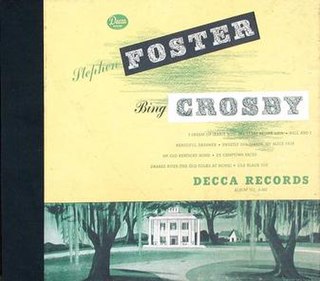
Stephen Foster is a compilation album of phonograph records by Bing Crosby of songs by Stephen Foster released in 1946.

Bing Crosby Sings with Lionel Hampton, Eddie Heywood, Louis Jordan is a Decca Records compilation album of phonograph records by Bing Crosby, Lionel Hampton, Eddie Heywood and Louis Jordan.

Christmas Greetings is a studio album of phonograph records by Bing Crosby released in 1949 featuring popular Christmas songs.
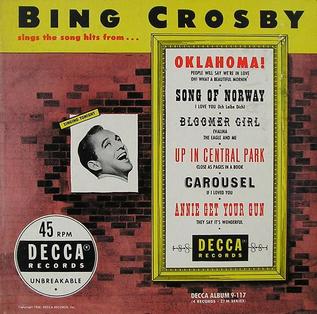
Bing Crosby Sings the Song Hits from Broadway Shows is a Decca Records compilation 78rpm album of phonograph records by Bing Crosby featuring some of the hits from Broadway musicals.

Bing Crosby Sings Cole Porter Songs is a Decca Records studio 78rpm album of phonograph records by Bing Crosby featuring the songs of Cole Porter.

Way Back Home is a Decca Records compilation 78rpm album of phonograph records by Bing Crosby featuring sentimental and homely songs.




















